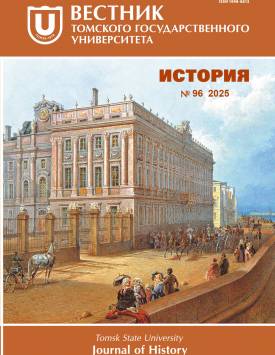The discussion on the nature of Zemstvo self-government in Russian conservative theories in the second half of the 19th and early 20th centuries
The purpose of this study is to consider the basic concepts of zemstvo self-government in the Russian Empire, which have developed within the framework of conservative socio-political thought. The sources for the research were the works of Russian conservative thinkers, scientific and journalistic articles, government documents, memoirs, diaries and letters. The question of the origin of the zemstvo and the nature of local self-government was directly related to the path that the new Russian zemstvo was to take, established by the "Regulations on Provincial and County Zemstvo Institutions" on January 1, 1864. In this sense, it was not only an ideological question, but also a practical one. Most Slavophiles (K.S. Aksakov, I.D. Belyaev, S.F. Sharapov, V.N. Leshkov, etc.) focused on protecting local life from excessive state interference rather than on limiting local self-government to economic needs. Their opponents, on the contrary, believed that the zemstvo self-government should be placed under stricter government control. In the view of the Slavophiles, a free, self-governing community that had existed in the Russian lands from time immemorial was supposed to be the prototype of the revival of zemstvo self-government in Russia. The Slavophiles called on the authorities to give the right to develop freely to local self-government, which in turn should refer to its historical origins - conciliarity, the ability to self-organize and at the same time loyalty to the autocracy. The self-governing zemstvo community and the autocratic power, according to the Slavophiles, could exist in a sense apart from each other, but at the same time, have common goals and objectives. According to the opinion of the "state guardians" (A.D. Pazukhin, M.N. Katkov, K.N. Leontiev, etc.) the concept of zemstvo self-government, independent from the state, has put a threat of creating a "state within the state", especially in the context of growing contradictions between the government and society. In the view of the guardians, the people's communities did not exist and could not exist separately from the state, but were its elements and as a whole part of the state organism. In their opinion, the zemstvo self-government should have been a part of the general state administration, integrated into the system of state institutions and solving local tasks, the circle of which should be outlined by the central government. The author comes to the conclusion that the historically grounded and deeply thought-out concept of the Slavophiles collided with the political reality of its time, in which it was not possible to fully embody the zemstvo ideals. The author declares no conflicts of interests.
Keywords
zemstvo, local self-government, Slavophiles, statesmenAuthors
| Name | Organization | |
| Saevskaya Maria A. | Moscow Financial and Industrial University Synergy | masha-saevskaya@yandex.ru |
References

The discussion on the nature of Zemstvo self-government in Russian conservative theories in the second half of the 19th and early 20th centuries | Tomsk State University Journal of History. 2025. № 96. DOI: 10.17223/19988613/96/9
